Table of Contents
Wix is the best eCommerce option for small companies, according to our research and testing. With frequent promotions and discounts, it’s always ahead of the competition regarding pricing and quality of templates and features.
As a result, Shopify landed in second place with its outstanding selling capabilities.
However, your website is the face of your business, so it must be consistent with your brand and unique to your sales process. This implies that deciding on the most exemplary eCommerce service carefully evaluates the features you desire and your budget.
Here are the best eCommerce systems for small companies that we’ve found. Each one has been evaluated based on feedback from our small company audience, who provided us with seven key parameters they felt were most essential. Read on for an in-depth look at each service.
What to Look for in an E-Commerce Platform
Ecommerce platform selection is similar to selecting a location for your brick-and-mortar shop. From the site’s reputation to the kind of assistance you may anticipate while launching your company, there are many factors to consider.
For some businesses, the appropriate eCommerce platform will enable them to create something genuinely unique. For example, a user-friendly backend with user-friendly inventory management abandoned cart recovery and several forms of web hosting can be ideal for you.
For those new to the world of eCommerce company management, an open-source commerce platform may not be the best choice. However, with these user-friendly tools, newcomers may find it easier to get started since they have various features, like free themes, drag and drop customizability, and the ability to handle endless items. Here are a few things to keep in mind while evaluating some of the top achievers we’ll be mentioning below.
- Price/Budget: While there is much more to an eCommerce solution than its price, as a small company owner, you will be wary of incurring any extra costs. For the most part, small business owners seek e-commerce solutions that are both feature-rich and reasonably priced. In addition, most open-source platforms and hosted systems on the market now come with free demos that you may use before you purchase.
- Backend resources: What type of help do you need to manage your internet business? Any number of features, such as access to WordPress plugins, CSS and SKU support, or even mobile app management systems, might be included in the most acceptable platform. Make sure you have access to all of your backend capabilities, including content management and inventory management.
- Scalability: Just because you’re operating a tiny firm today doesn’t indicate that it’s going to remain small forever. As your business expands, you may need the ability to offer digital items and accept additional payment methods and support for the sale of endless products. Your platform should be able to grow without a steep learning curve.
Speed and performance: Business owners will have difficulty persuading customers to purchase their items if their websites take too long to load. There is no limit to the number of items that you can put up on your website, so long as you have a reliable web host to keep things running smoothly. - Ease of use: A drag-and-drop editor for modifying your eCommerce solution, as well as extensive backend documentation, may contribute to increased ease of use. It is essential to remember that open source eCommerce systems are frequently more challenging to use than their hosted equivalents.
- The user experience: You must have a positive construction experience before you start designing your storefront. However, you must also take into account the consumer experience. Can you, for example, provide a selection of payment gateways? Is it simple for customers to make purchases from your online store? Can customers easily find what they’re looking for on your website?
- Marketing tools: Is your eCommerce platform capable of attracting new consumers and retaining the ones it already has? Some programs include abandoned cart recovery, SEO tools, and email marketing systems, which may be helpful for businesses. In addition, content management and marketing solutions may all help your bottom line.
- Customization: It’s easier to change the look and feel of open source platforms than commercially hosted ones. However, in most circumstances, you may still modify the look of your online business by employing real-time editors and themes. See if there are any alternatives for customization.
- SEO (search engine optimization): SEO guarantees that your site attracts the right clients and brings in a steady flow of traffic from search engines. Customizable URLs, alt tags for images, and more should all be available as part of your eCommerce platform.
Wix
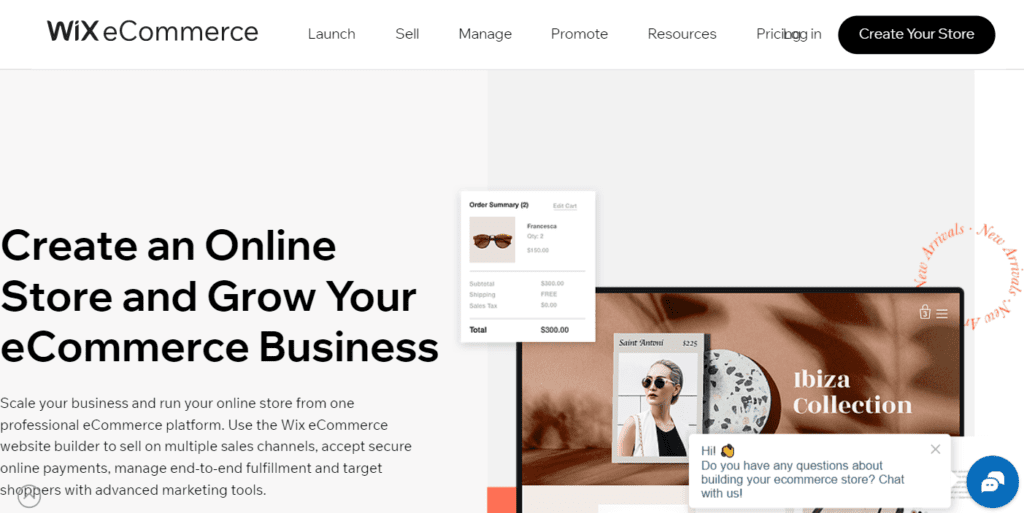
With Wix’s features, creative freedom, and customer service in mind, we believe it is the most refined eCommerce platform for small companies.
From a wide selection of more than 70 eCommerce themes to pick from, you can establish an online store that properly represents your business. Because once your website is up and running, you can’t go back and modify the template design.
In contrast to other providers, you may modify text and add items directly from the storefront, so you don’t have to edit from a distance while making changes to the storefront. In a hurry? It’s not an issue. Allows you to edit your website on the go using the Wix app
Even though it doesn’t have a dedicated eCommerce platform like BigCommerce or Shopify, it has all the features you need to run a successful online store. Multiple payment choices, secure checkout, and abandoned cart recovery are all included in this package.
Wix has just included some of the most excellent analytics tools available. As a result, your shop may be optimized, and efficient business choices can be made based on site visitors and store income to top goods and specific order numbers.
Ascend, a complete CRM and marketing product suite, and Corvid, a web development solution, were added to Wix’s eCommerce platform in June 2020.
It’s also improved its order management and fulfillment system. – Keeping track of and managing orders, printing shipping labels, and alerting suppliers and manufacturers to new orders is now a lot simpler than it used to be
Wix is the most effective eCommerce platform for the money, in our opinion, because of the high quality of its features and the low prices (on average, 36% less than competitors!).
Pros
- Customize your site with a wide selection of high-quality themes
- The ability to accept many forms of payment from your consumers.
- Hundreds of applications and plugins to choose from.
- There are several ways to get started for free.
Cons
- E-commerce functionality is limited
- To get your data, there is no option to export it
- Due to the lack of open-source development, it is difficult to add new features.
Shopify

Shopify was the clear winner regarding customer satisfaction or the percentage of customers who would suggest a platform to a friend. This measure was given a score of at least 4/5 by all testers.
Shopify’s user interface was defined as “clear and delightfully straightforward” by our researchers, making it simple to acquire the results you want from your online store.
In addition, you may modify your website’s template after it goes live, but you’ll have to re-design your whole business.
Keep in mind that Shopify is an eCommerce platform designed specifically for online sales. The platform has a vast app store with a wide choice of critical tools to help you grow your company, including Amazon integration, so you can manage all of your items from one location and customize your online shop to suit your needs.
In addition, whether you’re a drop shipper or a brick-and-mortar shop owner, it’s your best bet for selling online and offline (thanks to the range of store locator apps on offer).
Search engine optimization (SEO) is also a strong suit for Shopify. So if you’re looking for an eCommerce platform that’s a step ahead of Squarespace and Jimdo, this is it.
Shopify is a terrific alternative for ambitious, growing companies since it’s affordable, simple to use, and has a slew of outstanding sales capabilities. A 14-day free trial is also available.
Pros
- To assist you in getting started, they provide a free trial period.
- Variety of themes to choose from
- There are a lot of plugins available.
- All plans come with unlimited items.
- Payment alternatives that are already included in the system
- Suitable for a wide range of business proposals.
Cons
- Fees may soon pile up.
- The blogging platform is quite restricted.
Square Online
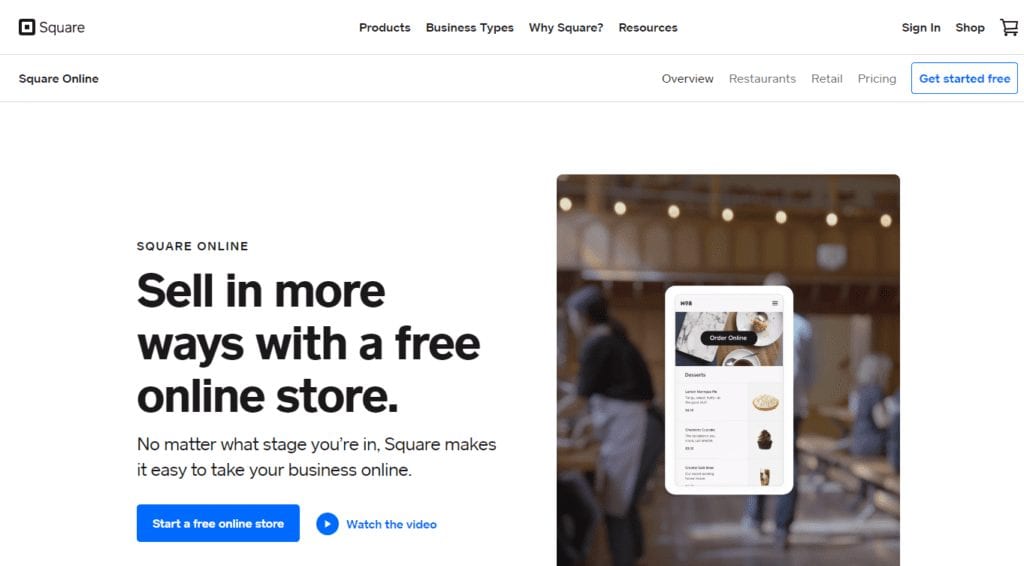
Are you seeking an eCommerce platform that will enable you to integrate your online and offline sales seamlessly? If this is the case, you might look at Square Online, Square’s site-building tool. To get a free website, you must already have a Square Point of Sale System. Weebly powers Weebly’s shop builder, so you’ll be limited to the same customization options as before.
Square Online is an excellent alternative for those who want to start an online store but don’t want to deal with the complexity of using Weebly’s store building option. As soon as you get started, you’ll have a professional-looking business up and running in no time. The sophisticated inventory management is also available since everything is integrated with your Square point of sale system. When an item sells online, your inventory is automatically updated in the shop’s constructor and artificial intelligence. As a result, you get a more sophisticated experience without having to shell out a bunch. Furthermore, with the free plan to get you started, there’s nothing to lose when it comes to expanding your store’s offerings.
Pros
- If you’re already making use of the Square ecosystem’s capabilities, this is a great option.
- Intuitive to use even for newbies
- Selling online and in-person at the same time
- Special inventory control software.
- Useful in the field of artificial intelligence
Cons
- For example, a lack of customizability at the checkout
- Restrictions on how you may handle payments
Squarespace
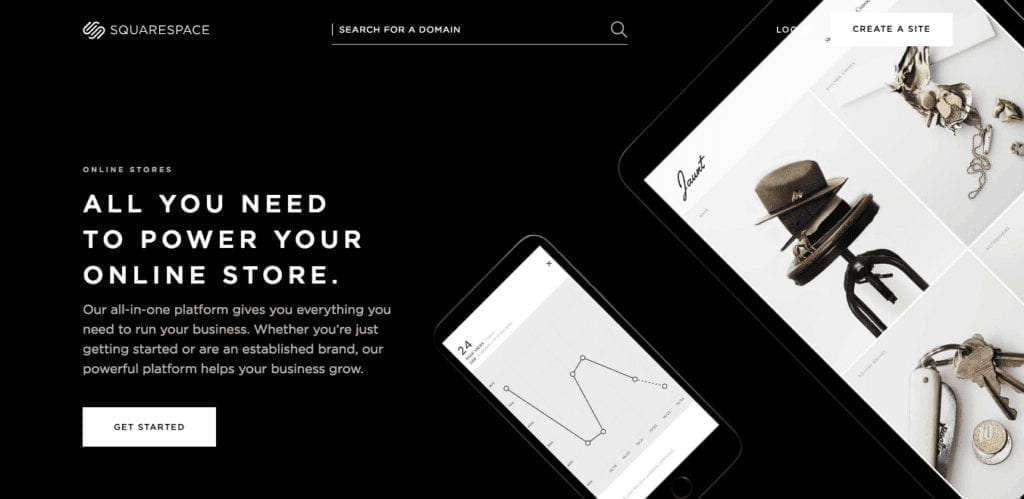
It’s hard to beat Squarespace as an eCommerce solution for firms looking for complete creative freedom. Although it shares many of Wix’s design elements, this cloud-hosted website builder has a few more sophisticated capabilities, such as social solid network integration.
Squarespace is an attractive option if you want to create a visually appealing online company or portfolio. You may select from a variety of sleek and contemporary layouts, and you can always modify your look if you like. It’s a shame that this product doesn’t have the same breadth of eCommerce capabilities that Shopify has. Plus, each yearly subscription comes with free SSL security and a free domain. The checkout process is mobile-friendly, and there are no transaction fees associated with any of your plans.
Pros
- Excellent use of social media.
- With a plethora of outstanding design options,
- Affordability-minded plans
- Assistive 24 hours a day, 365 days a year
- Annual subscriptions include a free domain name.
Cons
- Hefty costs for making purchases
- Payment methods are limited to Stripe, PayPal, or Apple Pay. Unfortunately, there is no app store.
Ecwid

To enable businesses who wish to sell their goods at any time, anywhere, Ecwid was built as a robust platform for online selling. As long as you’d like, you may open an account online and maintain it for free. When integrating with an existing website, social network, or company page, Ecwid is an excellent option. You’ll be able to manage all of your stores from a single dashboard.
Ecwid’s cloud-based platform is one of its most significant advantages. A hosted service implies that no installation is necessary on your part. Ecwid may also be added to any website through a plugin, including Drupal, Wix, Joomla, and WordPress. A responsive design, intelligent language identification, and the ability to link your site to many sites, blogs, and social networks at once are just some of the features you’ll find. Furthermore, there are no transaction fees or setup costs to use this service. In addition, you may collect payments in various methods, all of which are safe and secure.
Pros
- Uses the same URL as your current website
- Free and moderately priced premium plans are available.
- Sell on a variety of online markets and social media platforms.
- For the app store, you may design a mobile app
- Sophisticated machine translation
- Payment methods that are safe and secure are available.
Cons
- Integrating a credit card means paying a hefty charge
- Neither eCommerce nor a stand-alone solution (you need a website)
- On the lesser levels, there is no phone or live chat assistance.
- There is a lack of detail in the bacbackendrics.
Magento
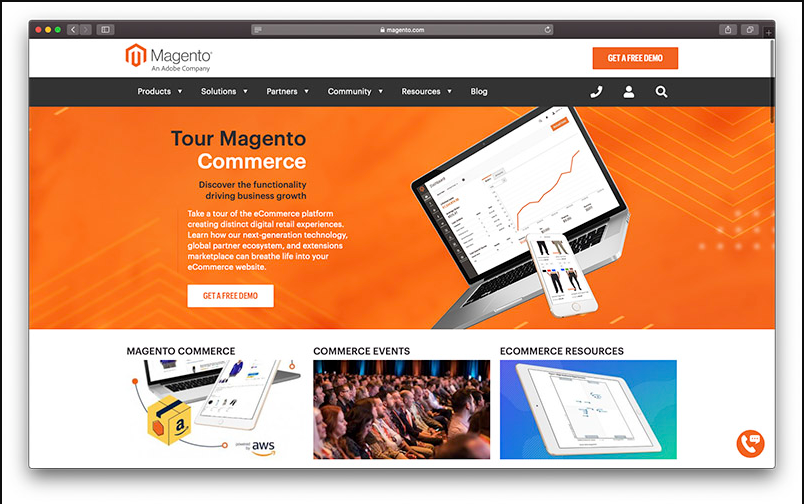
In terms of e-commerce platforms, Magento is a popular choice for established and successful businesses. When it comes to connecting with consumers online, some of the world’s largest corporations already utilize this technique. What’s more, Magneto may also be used to sell products on Amazon and other third-party marketplaces! Magneto’s free-to-download software is ideal for offering a next-level sales experience.
You’ll need a developer or a professional on your team to build something unique and stunning using Magento, which is the case with many open-source solutions. Magento has a thriving community of web designers and developers eager to collaborate with new companies to create the ideal website.
Pros
- Customizability is at your fingertips, thanks to open source.
- Your platform’s ability to be tailored to your needs
- For worldwide sites, it’s an excellent resource for developers.
- Multipurpose Magento shop
Cons
- Hard to get your hands on
- Setup costs might be prohibitive.
- To run your website, you’ll need to handle your web hosting and payment processing.
WooCommerce
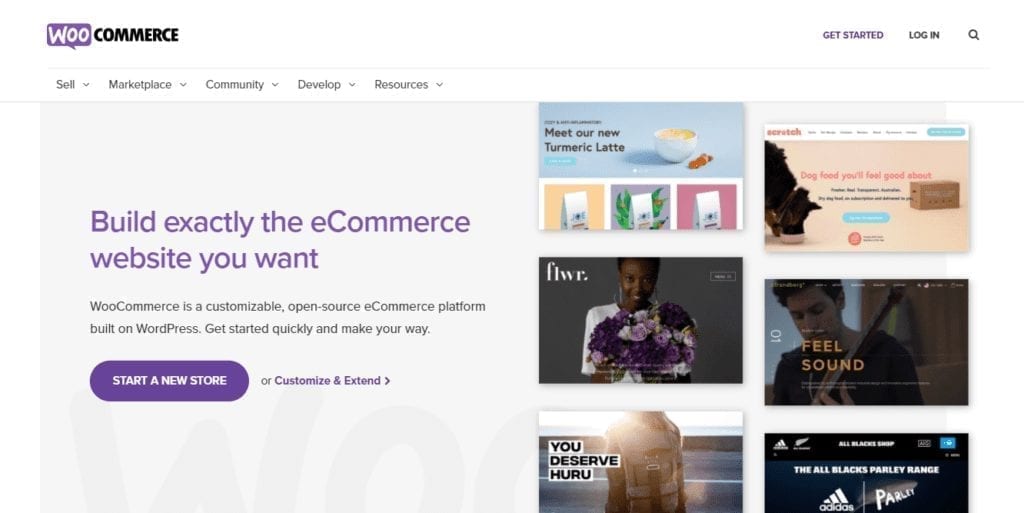
WordPress may be used to host a blog for your company. Using WordPress as a small business’s e-commerce website is also possible. The WooCommerce plugin makes it simple to build an eCommerce-ready website with WordPress.
Websites built using WooCommerce may be tailored to suit the needs of any small or medium-sized company. If you’re looking for an open-source eCommerce plugin, this one is for you. Among small companies that already use WordPress to some degree, this plugin is quite popular.
WooCommerce may be used to implement e-commerce features. Seeing and purchasing your items is a breeze, thanks to your well-designed website. It’s an easy-to-use plugin that may help you build a website rapidly.
To get the most out of your WooCommerce for WordPress website investment, you’ll have access to a massive community of developers.
Pros
- Products and orders may be purchased in unlimited quantities.
- Add any other features you want.
- It’s inexpensive, but you’ll have to pay for your web hosting.
- Customizable themes and a wide range of choices
- If you want to sell more, there are no boundaries.
- WordPress is the foundation for this site.
Cons
- Some technical expertise is required.
- A third-party payment processor is required.
BigCommerce
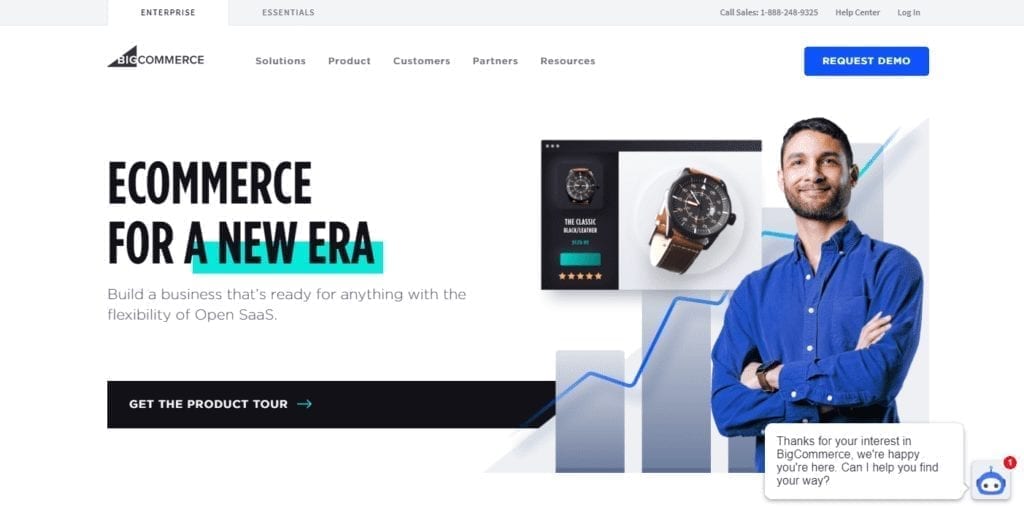
BigCommerce is another excellent e-commerce platform. Small and big companies may both benefit from using this platform to build eCommerce websites.
There is a wide range of eCommerce tools available with BigCommerce to help you develop your online store. For example, social media may be integrated into your website and used to promote and sell things.
BigCommerce makes it simple for you to sell your items on a variety of different platforms. It is possible to create storefronts for your BigCommerce site on Amazon and eBay. If you want to grow your business’s reach while maintaining consistent brand identity across many platforms, this is a terrific method to go about it.
BigCommerce, like Shopify, provides round-the-clock customer service. In addition, they may assist you in writing your site’s content if you need it.
Payment and delivery may also be taken care of by BigCommerce. You may develop and manage your website with ease with our platform.
Pros
- The visual merchandising tool created in
- Fee-free transactions
- Products, storage, and bandwidth are all unlimited.
- Options for rating and commenting on a product are available.
- Many free programs to pick from
- An excellent tool for selling across various platforms.
Cons
- Pricing might be a bit of a challenge to grasp.
- Setup is more complex than with some other tools.
- There are just a few free themes to choose from.
Zyro

Zyro is an easy-to-use and visually appealing website builder with a long history in the industry. As a result of Hostinger, the firm morphed into a whole new platform. There are no coding or design skills required to use this now-completely autonomous website builder.
The Zyro team has already created several exceptional designs that you can use to develop a website in a couple of minutes. Also included is a grid feature that is simple to use. As a result, your chances of ending up with an unbalanced piece of work will be reduced.
To provide your customers with the outstanding experience they deserve, Zyro has lightning-fast performance on all devices. This tool may even assist you in getting started if you’re having a hard time coming up with content for your website.
Pros
- User-friendly and quick to respond
- Builder with a grid for easy drag-and-drop
- Exceptional for fast-paced website development.
- Creators of artificial intelligence
- A year’s worth of free domains
- A free SSL certificate
- All premium plans come with unlimited storage space.
- Premium templates created by professional designers.
Cons
- There aren’t many options for blogging.
- There is no live customer service option.
- There is no way to alter the code.
- Customization options are limited.
GoDaddy

Small companies need an e-commerce and website hosting solution that is simple to use and intuitive to manage. So why bother learning how to utilize a new platform when you don’t have time? Unfortunately, a specialist joining a small firm’s workforce is usually out of reach financially for a small business.
To make setting up your shop as simple as possible, GoDaddy makes use of the ADI technology. In addition, it supports a broader range of sectors than many of its rivals. The Artificial Develop Intelligence integrated into GoDaddy makes it simple to design a website tailored to your unique market. Faster performance, on the other hand, sometimes means less room for creativity. When it comes to blogging, GoDaddy doesn’t provide the most tools to pick from.
GoDaddy offers one of the most user-friendly systems on the market at a reasonable fee. However, if you’re a small firm that’s just starting or is experiencing rapid expansion, the service might be a touch lacking.
Pros
It’s convenient and straightforward to use.
Intelligence-assisted Design
This is ideal when you need to be online quickly, yet you don’t know how to code.
Hosting is offered.
Cons
There is a lack of creative freedom.
There aren’t many sophisticated options.
The lack of blogging tools.
Big Cartel

Companies with a more significant internet presence typically turn to Big Cartel, often regarded as one of the most effective platforms available. This is because using the service to its full potential requires a solid foundation in computer programming. By themselves, the pre-built themes and design possibilities are woefully inadequate. However, this doesn’t mean that you can’t look into this option for your small business as well.
This is an excellent option for artists and small businesses who want to sell their products online, but it’s even better for those with coding skills or who know someone who does. There is also a free plan that allows you to begin selling immediately. Big Cartel features everything you need whether you’re selling one-of-a-kind works of art or other small-scale items.
It’s still worth checking out Big Cartel, even if you don’t have much experience with CSS HTML, and JavaScript. After all, it’s completely free. Just keep in mind that you get what you pay for. For example, there are no built-in blogging features, no PCI compliance, and a lack of design support.
Pros
- No cost service for small businesses
- The use of a custom domain is an excellent option for innovative businesses.
- Easy to set up for both online and offline goods sales
Cons
- Limited payment options require a fair level of coding expertise (PayPal or Stripe)
- There are just a few options for themes.
- PCI compliance and advanced support are absent.
Shift4Shop
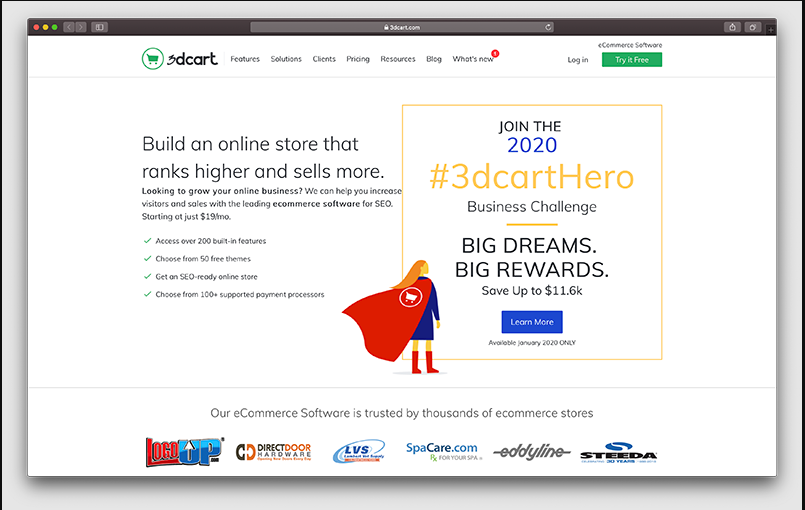
Shift4Shop (previously 3dcart) seeks to deliver a comprehensive eCommerce software platform for today’s company owners.
To design, advertise, and sell from the ideal online store, Shift4Shop offers all the tools you need at your fingertips. Shopping cart software and eCommerce purchase buttons are widely available. A great inventory management system is also available to help organizations keep track of their items and sales. Customization is impressive with Shift4Shop, since you may change your theme anytime you want.
It’s not perfect, but Shift4Shop has a lot going for it. For example, even though you have limitless orders, items, and bandwidth, you don’t get support for any mobile applications. So if you’re looking for an easy-to-use platform, Shift4Shop is not the best option.
Pros
- A powerful and customizable solution.
- The massive feature set is even on the most basic of plans.
- Cost-effective pricing
- POS for offline sales and a 15-day free trial
- Products and bandwidth are unlimited.
Cons
- If you’re a novice, it’s challenging to set up
- The free themes available now seem a little stale.
- The number of available applications is somewhat limited.
EKM

Compared to other eCommerce platforms like Shopify and WooCommerce, EKM doesn’t receive nearly as much attention as it should. But it does not imply that it is not worth your time and effort to learn more about it. One of the first platforms to debut in the United Kingdom was this fantastic tool, established in 2002. In terms of design, it’s pretty similar to Shopify, but it also has many unique features. This service is most suited to sellers in the United Kingdom, although you may use it elsewhere.
Everything a small company owner needs to sell online, including their domain name and payment choices, is included in EKM’s all-in-one eCommerce platform. For those who like a wide variety of customizing possibilities, there are more than 150 themes available. All options include free SSL certificates and a free domain name.
As a result of the service’s concentration on the United Kingdom, customer assistance is also based in the UK. As a global brand, this may be an issue.
Pros
- An account manager for three months will assist you in getting your business up and running.
- There are many positive reviews on the internet for this product.
- SSL certificate and a free domain name
- Fee-free transactions
- A plethora of options
- Add a WordPress blog to your site.
Cons
- UK-based support is available.
- All plans are subject to VAT.
- Prices aren’t the most affordable on the market.
X-Cart

If you’re looking for an open-source solution for your online store, X-Cart promises to be your best option. Because X-Cart costs a single, one-time licensing fee, it stands apart from many other paid solutions on the market. In addition, unless you choose the X-Cart hosted solution, there is no monthly fee.
The X-Cart experience is excellent for small companies who want to keep expenses down as much as possible by offering a simplified and straightforward approach to start selling online. In addition, there is a free version of the program that you may try to see whether it’s a good fit for your needs. First, however, like with other open-plan systems, you’ll need to locate a hosting service.
X-Cart also has a minimal selection of themes.
Pros
- Editing options are many.
- Great for worldwide sales because of WordPress’s simple integration.
- Compelling SEO features include the ability to import and export inventory data.
- One-time charge
Cons
- As a result, you’ll have to select your own web hosting company
- Insufficient options for customization and additional fees for assistance
- In terms of pricing, things aren’t crystal obvious.
Weebly
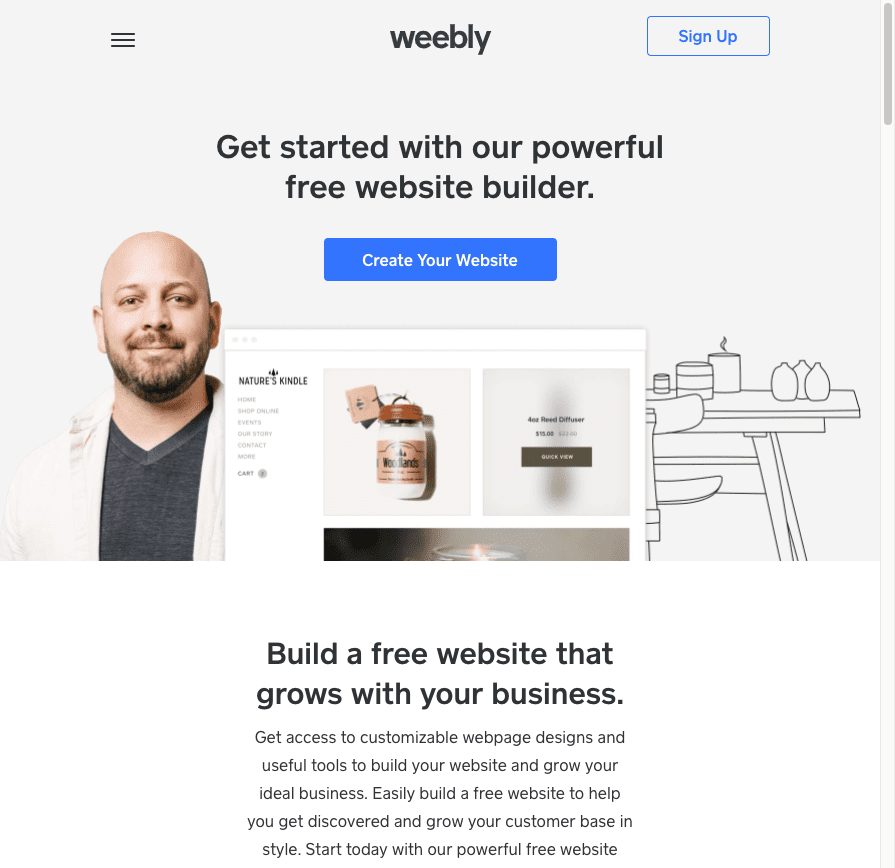
When it comes to setting up an online shop, Weebly is an excellent option for small enterprises. It also includes marketing automation. There was a third-party program needed for such functionality on other platforms, such as Shopify.
Weebly’s eCommerce platform costs between $8 and $38 per month, depending on the package you choose.
If speed and performance are essential to you, you may want to look elsewhere for an eCommerce platform. Most e-commerce sites take an average of 3.2 seconds to load. Weebly websites take an average of 3.8 seconds to load. It may not seem like much, but the internet moves so quickly that it may as well be an eternity.
Weebly’s design and user-friendliness are unparalleled. There are several templates to choose from. All of them are optimized for mobile usage.
Creating a high-quality, professional-looking internet shop may be done by anybody with no prior understanding of computer programming. BigCommerce, on the other hand, is more user-friendly for beginners, but it isn’t as perfect for those who want to have a developer come in and personalize the site.
You get a lot for your money with Weebly, particularly considering the low pricing. Selling digital items will need the most expensive plan tier.
All of Weebly’s plans contain this feature if your company sells customized items. In contrast to many other companies, we can provide a wide range of custom-made items.
On the other hand, Weebly does not contain features like one-click upsells, abandoned cart emails, real-time shipping costs, tracking, or subscription payments. Third-party add-ons won’t add these capabilities.
Pros
- Superbly crafted web pages.
- Manage your shop more efficiently with an intuitive dashboard.
- Weebly is an excellent value for the money. It’s the cheapest marketing automation service out there.
- Email programs with a lot of muscle.
Cons
- Weebly isn’t the best option if you’re concerned about SEO. When it comes to online shopping carts, it ranks towards the bottom of our list of the worst ones.
- In addition to the costs your payment gateway charges, you will be charged an extra transaction fee. It’s possible to spend extra on a platform if you have a lot of sales.
- There’s no way to link it to Amazon.
PrestaShop
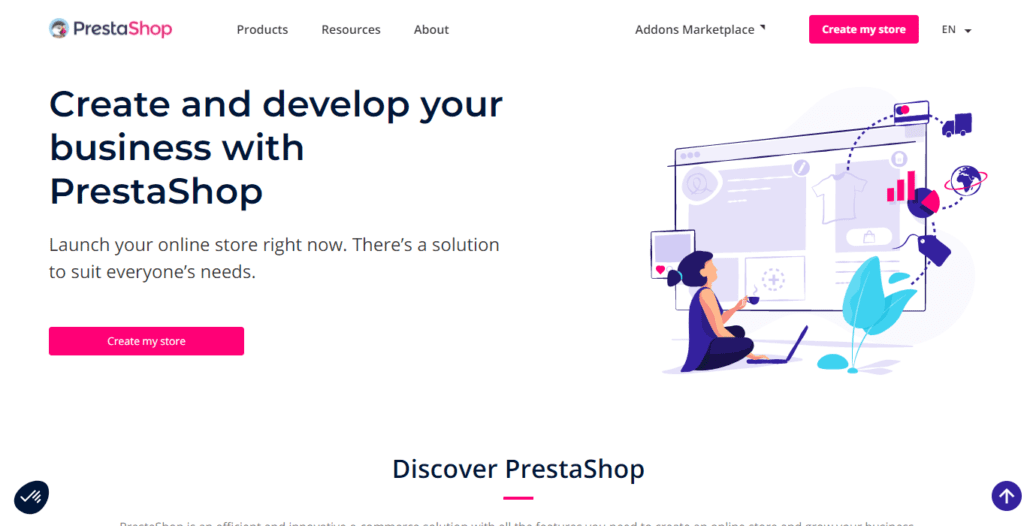
e-commerce platform PrestaShop is free and open-source. In this case, it’s a free, open-source shopping cart. WooCommerce is a free, open-source platform. However, it comes with extra charges to consider. A cloud-based option is also an option, but it comes with a slew of drawbacks.
Two thousand two hundred ten responsive site design templates are available for purchase in the PrestaShop shop. To a large extent, the designs originate from third-party programmers. The themes cost from $75 to $740. When you download the PrestaShop software, you’ll receive the single free option.
The editors let you change the look of your site’s theme, such as adding a logo and rearranging the layout. However, a developer will be needed for more complex changes.
Almost 4,000 third-party apps and integrations may be found in the PrestaShop’s Official Add-ons Marketplace, which is open to the public. In addition, it’s possible to reach a worldwide audience with many of them since many of them are accessible in languages other than English.
Only roughly 150 of the integrations are free of charge. The most affordable selections start at $50, with an average price of $65 or less. There is an $860 price tag for the most costly choice. You’ll have to pay $100 to use Zapier. Are you interested in integrating with Salesforce? In all, you’ll have to cough out $310.
Adding integrations to your product will raise the price. It may not be more cost-effective than choosing another eCommerce platform that has more built-in features. There is no guarantee that a fully-hosted solution would cost less than PrestaShop. There is no one-size-fits-all answer. Your online shop will most certainly need some paid add-ons, regardless of the platform you use.
Another thing to think about is this:
There are hundreds of third-party add-ons to choose from, and they may or may not function together. If you have a lot of modules installed, you may have problems. If you have a problem, you may not be able to get help from customer service. You may reduce this danger by paying careful attention to the app store’s reviews. If you discover that many individuals experienced issues with it, you may want to look for a different solution.
Pros
- There is a comprehensive demo available.
- It may either be installed locally or hosted in the cloud.
- Sell your products all around the world.
Cons
- The cost of a high-quality hosting service may soon mount. A domain name and an SSL certificate are also required.
- Add-ons may cost a lot of money.
- It’s only one free theme out there.
- To avoid dealing with technological issues, the cloud-based version is strictly limited. So, for example, if you subsequently want to switch to a self-hosted alternative, you can’t do so.
- For payment processing, you’ll need a merchant account or a third-party payment processor.
Volusion
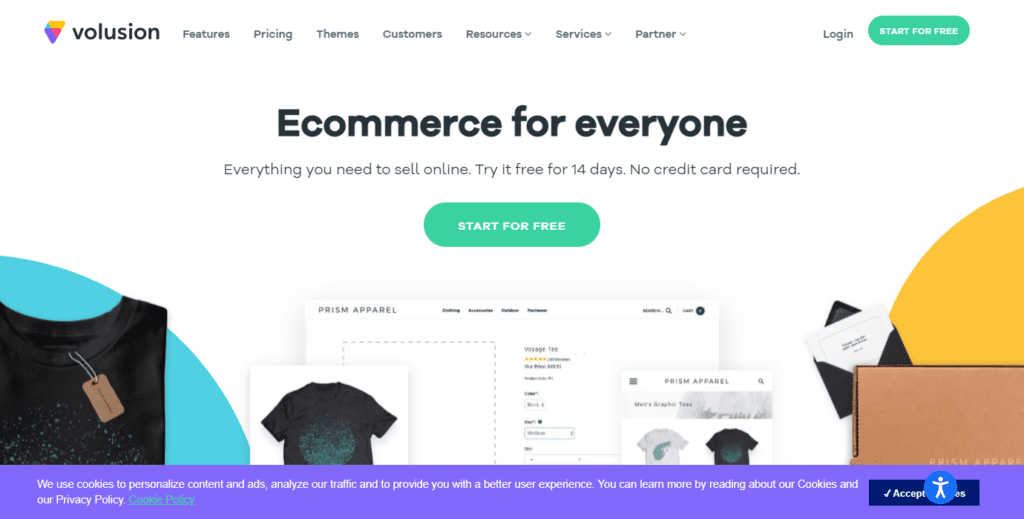
Hosted e-commerce platform Volusion Many small companies choose this as the cornerstone of their online store since it is one of the most popular and economical solutions.
Shopify and BigCommerce are the company’s primary rivals in the e-commerce space. Volusion focuses on backbackendations, while Shopify focuses on front-end functionality and marketing tools.
Even if it’s cheap, it takes a long time to load. User experience may suffer as a result, and search engine rankings may be harmed as a result.
Starting at $29 a month, you may upgrade to a plan that costs up to $299 a month. How many goods you can host in your shop and how much bandwidth you have are all dictated by your plan. Overage costs will be incurred if you exceed your bandwidth limit.
There are 100 goods and 1 GB of bandwidth in the cheapest package. Even on the most expensive plan, you’ll get 35GB of data transfer and limitless items.
If you don’t know how to code, Volusion is an excellent choice. The user-friendly interface makes it simple to create an eye-catching website without any prior coding knowledge. Free themes are available from a variety of sources. A premium theme will set you back at least $180 if one doesn’t work out for you. For a competitor’s theme, you can expect to spend around the same.
The WYSIWYG editor is not necessary if you have basic knowledge of HTML and CSS to make changes to your website’s design.
There are over 30 payment channels available to Volusion customers, including PayPal and Amazon Pay. In addition, no additional transaction costs are deducted from your credit card processing fees regardless of the processor you choose.
If you’re an entrepreneur who wants to expand your firm in the future, Volusion is the perfect solution for you. For those who just starting started with an e-commerce site, this may be a good option. Finally, if your small company relies on a subscription-based business strategy, this is an excellent alternative for you.
Pros
- SEO is one of the built-in marketing tools.
- Allows for CSS tweaks.
- Taxes and shipping costs are calculated automatically.
- In-depth coverage of the story.
Cons
- Lack of pre-installed blog software.
- Typographical errors or misspellings will prevent consumers from finding goods on the site’s search feature.
- Each plan has a limit on the amount of data that may be sent.
- The lowest tier programs have a smaller selection of items.
- There are just a few free themes available.
- Volusion Payments is only available to U.S.-based businesses.
Final Thoughts
You can see how difficult it is to develop a list of the top eCommerce website builders. One eCommerce company’s strategy could be entirely inappropriate for another. All of them are claiming to be the finest, but not all of them are the best for you.
Choose two or three of the top eCommerce systems on our list to investigate in further detail. Then, try out the shop builder for free by signing up for free trials. This might assist you in deciding which one to invest in for your internet shop.
When it comes to setting up an online business, what e-commerce platform are you considering? What eCommerce systems for small businesses have you previously used? We would immensely appreciate it if you could write us a review. To ensure that our evaluations are fair, we rely on the contributions of individuals like you.
